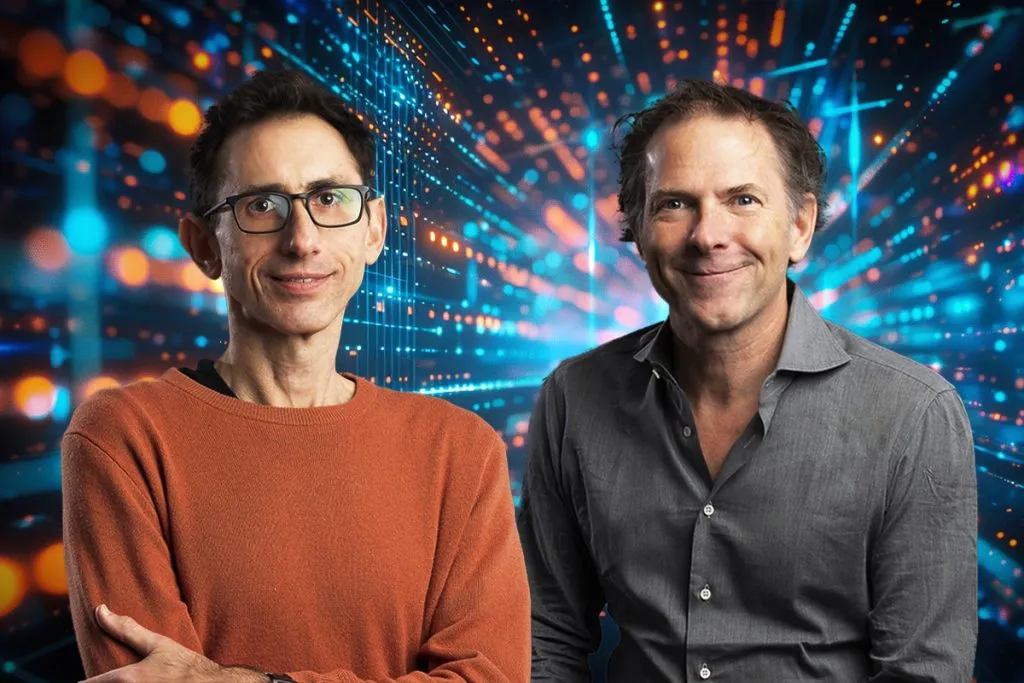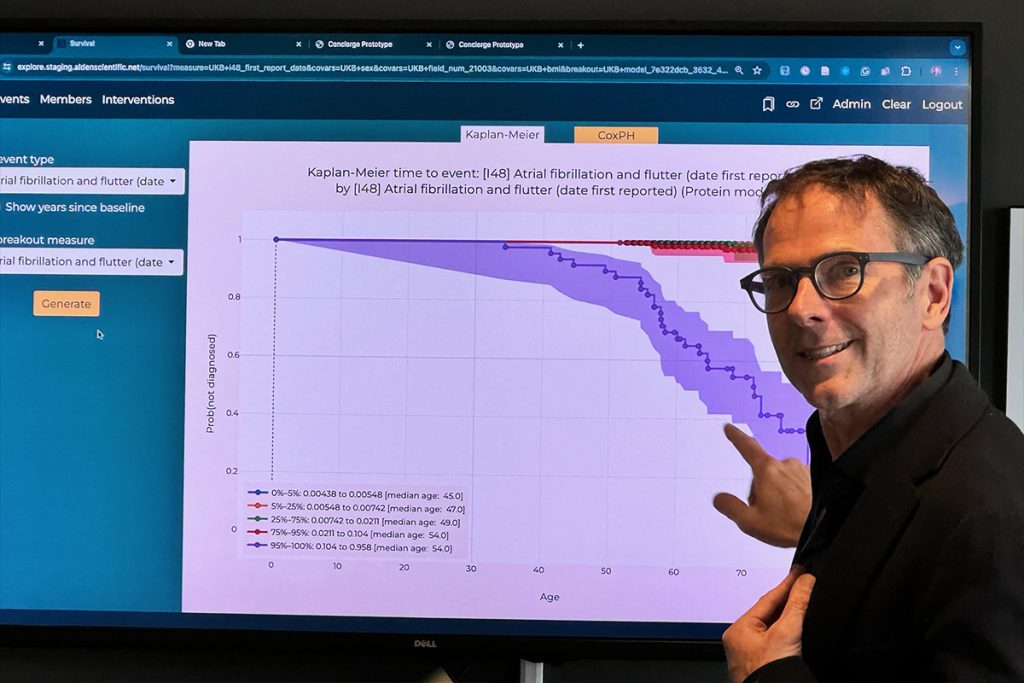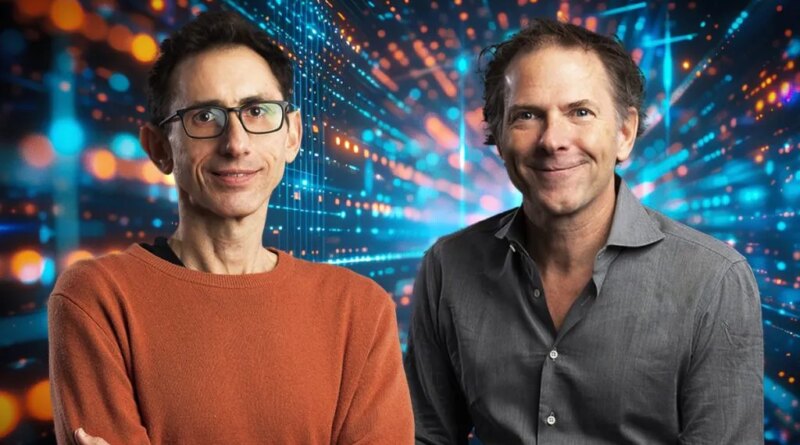Combining proteomics and AI to enable ‘new era of healthcare’

Alden Scientific’s AI-powered analysis tool measures a person’s risk for hundreds of health conditions, and the impact of potential interventions.
Understanding aging and aging-related diseases requires the analysis of many factors, including human genetics, the immune system, epigenetics, the environment, and more. While AI has long been touted for its ability to shed light on these human biological challenges and enable the next generation of healthcare, we are yet to see the emergence of tools that fulfill this promise through the truth.
Using advanced plasma proteomics, US startup Alden Scientific has created AI models capable of making the connections needed to assess a person’s health status and disease risk. The company’s device measures more than 200 different conditions, including major causes of disease and death such as Alzheimer’s disease, heart disease, diabetes and stroke. Importantly, its models also help one understand how interventions affect these risks.
With many of Silicon Valley’s top investors among its early adopters, Alden is now using its platform to conduct IRB-approved research designed to provide “long-term insights into collaboration between environmental, biological and medical issues.”
Longevity.Technology: Alden was founded by former entrepreneurs Jamie Heywood and Jeff Cole, developers of the health data platform PatientsLikeMe, which was sold to the insurance company UnitedHealth Group in 2019. , the company recently made the unexpected decision to speak exclusively to LT about its work. We caught up with CEO Heywood, who explained why he believes Alden has cracked the code when it comes to the future of healthcare.
An MIT-trained mechanical engineer, Heywood switched to biomedicine after his brother was diagnosed with ALS in 1999, and has since focused on construction companies in improve the treatment and management of health and disease.
“From the ALS Therapy Development Institute to AOBiome and PatientsLikeMe, I’ve been involved in disease discovery, drug development and healthcare for 25 years,” he says. And it gave me a unique, personal perspective on what the medical and research system can and cannot explain, in terms of understanding how to intervene in the individual.


Better tools needed
Heywood and Cole noted that even with genetics and comprehensive health care information, modern medicine lacks the tools to better understand human differences to guide individualized care and differentiate it is clear to whom, when and where a certain action can be applied.
“Whether it’s a stem cell transplant or a new drug for senescence or autophagy, or any new process, how do you know what’s going to work for you?” says Heywood. “As an individual, is rapamycin going to help me, or Metformin, or sirtuins, or taking more fiber? What’s going to change the course of my life? And the answer is, we don’t have the tools to tell us. today.”
Although he believes that a great deal of work is going on around the world to try to find answers to those questions, Heywood believes that nothing comes close to providing the depth of understanding needed to succeed in care.
However, tools and data are starting to emerge. Today, AI biopharma and drug development companies are using advanced technologies to discover new targets and understand health and disease. But these tools are expensive, difficult to use and require strict quality control and standards.
“Our idea is to use the same tools to guide people to make the best choices for themselves,” says Heywood. “Alden has created the ultimate platform that enables that. The key to this is using these advanced research assays not just targeted clinical biomarkers and making that information useful to individual.”
He adds: “People make decisions about the most important thing for them, their health, with very little understanding of what drives their individual biology.” “What I’ve learned from early discovery and from exploring the new fundamentals of biology is that it didn’t have to be that way and that the technology that provides that understanding is now available; it is expensive and requires different skills to analyze and use.”
Using an LLM for longevity
The tools Heywood is talking about are based on machine learning algorithms, similar to large-scale linguistic technologies, such as ChatGPT combined with advanced multi-omic bioassays such as proteomics, metabolomics and other technologies used to discover novel biology.
“However, those tools have not been used to look at the most sophisticated ways to measure people’s differences — to establish what action might make a difference in what they care about. ,” he says. Whether it’s Alzheimer’s, heart disease or cancer risk, or grip strength, fluid intelligence, or even baldness.”
Heywood says Alden aims to focus the power of advanced AI tools on understanding health at the individual level.
“We’re using this technology today – we’ve built one of the best machine learning and biology teams in the world, and we’re correlating that data to find out what the differences, times and conditions mean,” he says. I believe we are only at the beginning of the revolution in digital medicine.”
Under the control of Alden’s AI
Alden has collected a large amount of social and property data that it uses to build its models. The primary training data for the company’s AI models comes from the UK Biobank’s recently released proteomics dataset of over 50,000 individuals. Each report contains a large amount of information, including genetics, medical records, labs, metabolomics, proteins, functional analysis, questionnaires, repeat basic tests , blood and urine tests, imaging and more.
From a user perspective, Alden’s main source of data is advanced blood testing – using a proteomics test that measures 3,000 proteins in plasma, which Heywood says will soon increase to 5,500.
“We’ve built advanced AI models to understand how these proteins interact with a person’s genetics, immune system, epigenetics, environment, infection, and even what they eat and drink,” he says. “For example, compared to current risk estimates, we believe our environmentally responsive model provides a 50-fold accurate assessment of a person’s risk of developing Alzheimer’s in the next 10 years. “
Enabling a new era of health care
Importantly, in addition to assessing risk, Alden also aims to provide insight into what drives these risks in an individual, and how that risk changes over time based on age and activity. which they take.
“We are able to create ‘what if’ scenarios that show the impact of an intervention on a specific risk, and then report changes in this risk based on the outcome of the intervention,” says Heywood.
In fact, the advanced analysis and analysis that Alden does on this platform is not cheap, which is why the first users of its tool will be “ultra-high-net-worth” people. A veritable Who’s Who of Silicon Valley investors have already signed up (we’ve already seen the list), and these early adopters will form the first cohort in “Aurora Discovery” – an IRB-approved health study designed to demonstrate the effectiveness of the technology.
“We’re at the beginning of the journey, and the first users of our tool are the observers, the people we’re working with to create a map of people’s health, just like the first people used GPS,” says Heywood. ,” says Heywood. “However, we have a plan to drive scale and cost so that, over time, this can become an accessible test for everyone at a price that reduces the cost of care while improving outcomes in across the board.”
“Imagine having an accurate, low-cost digital image of not only disease but health itself. We believe Alden Scientific will eventually become an integral part of visiting care offices. 500 million every year. And I think that will help the real prevention and the new era in health care.”
Photos courtesy of Alden Scientific
#Combining #proteomics #enable #era #healthcare
